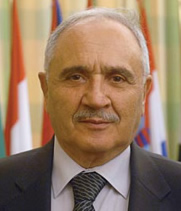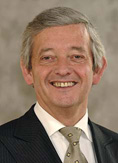Istanbul '09 Workshop |
||||||||||||
| Turkish Defense Minister Vecdi Gonul, Workshop Patron | 26th International Workshop on Global Security |
|
|
|||||||||
Proposed Workshop Themes |
||||||
Workshop theme: Principal sub-themes (suggested): |
Over the last year, the international security situation has evolved dramatically in a direction that few predicted. Following a sharp rise in energy, food, and other prices that tilted the global economy toward recession, the explosion of the subprime mortgage crisis threatened the solvency of even giant financial institutions and pushed the recession deeper. Governments have been forced to intervene on a nearly unprecedented scale. Economic uncertainty is fast becoming the greatest risk for international security, because many countries will now find it difficult to meet military obligations or achieve vital humanitarian ambitions. In international security and foreign policy areas, the U.S. has an ambitious agenda including withdrawing from Iraq, addressing the difficult military situation in Afghanistan, and relying more heavily on diplomacy in dealing with security challenges. |
|||||
Principal Panels and Workshop Sessions |
|
Opening dinner debate. |
|
 GEN Karl- Heinz Lather |
Dealing with crises in Afghanistan and the Middle East. NATO cannot afford to lose in Afghanistan, but success there is elusive. In fact, the conflict has spread to Pakistan, where many Taliban fighters fled. Their influx puts pressures on Pakistan which must deal with fighting within its borders. To the North, Kyrgyzstan, under Russian influence, threatens to close a logistically-important U.S. air base. While the U.S. is sending 17,000 troops to Afghanistan and Allies are being asked to increase their efforts, some Alliance leaders are calling for a new approach: They stress the need to better the life of the Afghani people by improving the government, which includes strengthening the police force and reducing corruption. They are also insisting that civil reconstruction efforts have a far higher priority. In addition, President Karzai believes it is vitally important to demonstrate more concern for populations during military operations. According to some political leaders, Iran and Pakistan must be brought into the process in order to benefit from their influence. |
|
 Amb Ahmad Masa'deh |
Strategies for dealing with regions in crisis: Israel, Palestine, and the Middle East. The Israel-Palestine conflict is at the heart of many serious crises across the globe—ranging from 9/11 to ongoing conflicts, including Iraq and Afghanistan, to tensions with Iran. Currently, prospects for peace between Israel and Palestine are not encouraging. Israel’s recent elections favor right-wing parties, which might prefer military operations over peace negotiations. In fact, the Israeli right and Hamas may mutually benefit from a continuation of tensions that will help keep them in power. International actors such as the UN or the U.S. have not been effective in bringing Israel and Palestine together, partly because the U.S. has historically sided too openly with Israel to be an effective broker. For this reason, the efforts by Turkey, Egypt, and other regional actors to help achieve peace are especially important. With time, the increasing efforts of some Jewish-Palestinian organizations to bring their countries together may also bear fruit. |
|
How can the international defense industry contribute to the new NATO strategic concept? NATO’s current development of a new Strategic Concept might offer the international defense industry a chance to provide more inputs than in the past. If so, future techologies and capabilities could be considered more effectively in the long-range planning process. This might be attractive for some governments that want to better prioritize defense investments as well as for defense companies that seek to interact with governments in the early planning stages of defense investments. Moreover, since the economic crisis is fast becoming the central challenge for global security, the defense industry—through its great size—offers an important opportunity to stimulate economies not only by providing greater security but also through defense job creation and defense R&D investments. Defense companies (and defense ministries) can also stimulate their economies by encouraging government investments in key areas ranging from education and basic scientific research to the development of the next-generation Internet, better Internet penetration in small communities, and a host of other opportunties. |
||
 DASD Robert Lentz |
How can we deal with spam, virus, and cyber attacks? |
|
 ADM Luciano Zappata |
Seeking a new strategic concept and trans-Atlantic vision. NATO is now seeking a new strategic concept and trans-Atlantic vision, as Admiral Di Paola has long advocated. This could potentially lead to a broad shift in strategic emphasis toward dealing with such issues as oil, water, and natural resources scarcity, global warming and climate change, demographic growth, poverty and increasing income inequality, and other issues that strongly affect international security.
If the global economic difficulties continue, the development and implementation of the new strategic concept may be harder than expected since countries may face significant budget constraints on military operations and vital humanitarian projects. Other challenges for NATO will certainly include dealing with the U.S. withdrawal from Iraq, the difficult war in Afghanistan and how to reengage with Russia.
Yet, if recent history is a guide—the biggest security risks may be so unexpected at the present time that they have not yet found a place on anyone’s list. Panel contributors: Admiral Luciano Zappata, Deputy Supreme Allied Commander-Transformation |
|
|
The Way Ahead. Wrap-up panel at conclusion of workshop. |
Turkey's Role in Regional and Global Security |
Turkey is “a staunch ally located at the center of the world’s hotspots and an active regional power that plays a significant role in mediating area disputes.” In addition to participating in regional initiatives, Turkey is an active member of NATO, has begun the EU accession process, and has been elected as a non-permanent member of the UN Security Council. Turkey is working actively to achieve peaceful relations with all of its neighbors.
- Iraq. It supports Iraq’s stabilization and economic development, although it is deeply concerned by the PKK terrorist organization in northern Iraq.
- Israel-Palestine. The Israeli-Palestinian conflict should be resolved according to the “roadmap” that will permit the two states to live side-by-side. Turkey has promised to contribute $150 million to assist in rebuilding a future Palestinian state, while Turkish companies, together with Israeli and Palestinian firms, have formed “The Industry for Peace Projects” of the “Ankara Forum.”
- Turkey-Arab relations. By establishing relations with the Arab League and Gulf Cooperation Council (GCC)—as well as the Istanbul Cooperation Initiative (ICI), Turkey hopes to help strengthen NATO ties with Arab and Gulf countries.
- Afghanistan and Pakistan. In Afghanistan, seven years of military operations and vast financial contributions have not achieved stabilization, which can only be attained by the full use of political, diplomatic, and economic means. Turkey has initiated a trilateral summit with Afghanistan, and Pakistan.
- Cyprus. The Cyprus issue needs to be resolved with the UN Secretary-General’s assistance and based on the long-established UN guidelines. The 3 September initiation of a dialogue by the two leaders on Cyprus gives reason for optimism.
- South Caucasus. Unresolved conflicts in the South Caucasus—as shown by the recent Georgia-Russia conflict—are an obstacle to achieving regional peace and stability. Turkey has launched the “Caucasus Stability and Cooperation Platform” (CSCP) which will hopefully contribute to regional peace by augmenting existing mechanisms.
Workshop Sponsors |
||
 |
||


 Dutch Defense Minister Eimert van Middelkoop
Dutch Defense Minister Eimert van Middelkoop

